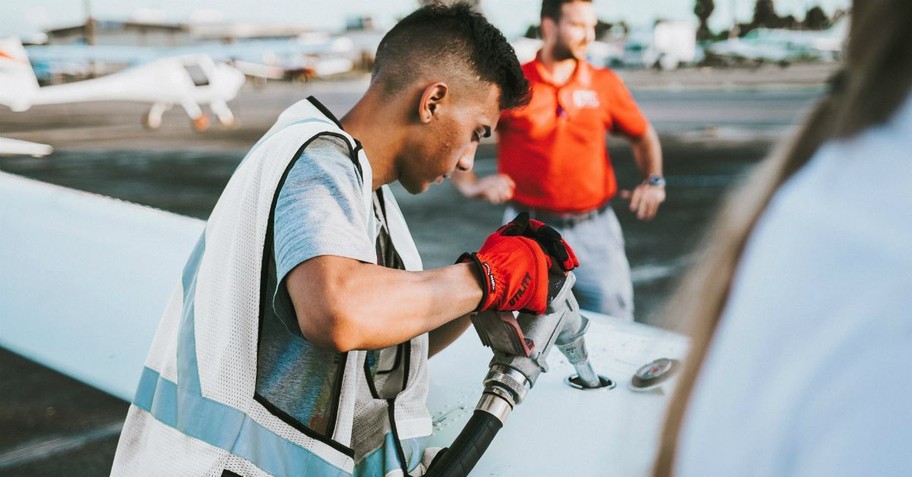Out of Gas – with Somewhere to Go! How to Refuel for Life’s Demands

Out of gas! Ugh. You’re kidding me. Yes, I was the guy slowing down traffic just prior to rush hour. I saw the warning light – at some point. I had not noticed it until partially into my trip. However, I know this vehicle well. We’ve been traveling companions for years – almost 300,000 miles together. When the gas light comes on I have about 30 miles more that I can drive.
Embarrassed? Yes. This has never happened before. Plus, I have somewhere I am trying to go! I was not out on a pleasure drive.
So what happened? I can’t put it all together but there were some key components to the debacle. Early in the morning on my way to teach, my mind was on everything but how much fuel was in my tank.
With an imminent class, a full schedule, pending deadlines, and life on my mind, I was not paying attention to the dashboard lights. I did notice the warning light, however, as I pulled into my parking spot. I immediately thought, “I’ll get gas later today.”
Well, later arrived and so did the urgency of my next appointment. By this time, I had forgotten about the fuel, only to be reminded as I turned on the vehicle. “But I should have 30 miles more before I run out of gas, and I only need to go 10.” Or at least, so I thought.
I failed to consider two key components. First, I had not paid attention to when the warning light actually lit. And second, I rebuilt the engine and have not tested how far it can go now once the warning light appears. There’s more!
Photo Credit: ©Getty Images/Metamorworks

Are you running on empty?
Some days we may all risk to run on empty. Even though the warning light is lit, we jeopardize our safety and the good of our vehicle to keep going. We think through the options before us and go for it.
For instance, “I know certain things about this vehicle. I know how far it will go. I have been here before. Since that is true, I will take a calculated risk.”
This is all good until it is not.
Driving with an almost empty tank fails to recognize three key components:
It fails to give heed to the warning light. The dashboard instrument panel is there to help you. When a light comes on, the driver is to be warned. Something is not right. There are sensors all over the vehicle to provide you a moment-by-moment sense of what is happening with your vehicle. The lights are there for you and your car’s protection.
It risks potential harm or damage. One mechanic writes: “The primary concern when driving on empty is the possibility of running out of gas and getting stuck on the road, which is not only a hassle, but also a potentially dangerous situation. You may break down on the freeway, where the surrounding cars are traveling upwards of 70 MPH, or you may break down on a blind turn on the highway, where a vehicle could rear end you. Or you could run out of fuel in the middle of a desert…or on a frigid snowy road…. That said, driving on empty can also do damage to your vehicle. If you do run out of gas, you can do damage to your catalytic converter, which may then need to be repaired or replaced as a result. Even the simple act of driving with a low amount of fuel in your tank can damage your fuel pump, as any debris or contamination in the gas (which naturally settles at the bottom of the tank), will be sent through your fuel pump when the tank is nearly empty. You’re not going to ruin your car the first time you drive it with the low fuel warning light on, but it’s a harmful practice to do regularly.”
It misses the simplicity of the fix to the situation. The fix is not that hard. Get fuel. Take the extra few minutes to fill your tank. Yes, it does take an extra minute or two, but the extra time and benefits from it are far better than the risks involved in ignoring it. Slow down long enough to fuel up before it really slows you down!
Photo Credit: ©Thinkstock/Shironosov

Pay attention to the warning lights.
There is more to this story than just vehicles and fuel.
Each one of us has a limited supply of physical, mental, and spiritual energy each day. We can become depleted just as easily as a vehicle. We are not made to run endlessly, mindlessly, or carelessly. We must also get nourishment for our body, mind, and soul.
This point is driven even deeper for me because just hours before running out of gas I had asked a friend to be in prayer with me. I told my friend that I was physically tired, mentally taxed, and spiritually uneasy. I had asked him to just hold me accountable and pray with me.
In addition, I had a great conversation with a couple of students, whom I asked about some stuff over which we had been praying together. As they told me their story, I teared up and even mentioned to them, “You know we all have days like that. You can even pray for me today that I also will respond to my own pressures in a godly way.”
We fail when we do not pay attention to the warning lights, risk potential harm or damage, and miss the simplicity of the help that is provided.
Photo Credit: ©Unsplash/Jeshoots.com

Fill up on God’s promises.
God provided us a great passage to help us begin the refueling process.
In Lamentations 3:1-21, the prophet Jeremiah is rehearsing all the things that are wrong.
Yet, he says there is one thing he calls to mind and it produces hope:
Through the Lord’s mercies we are not consumed; Because His compassions fail not. They are new every morning; Great is Your faithfulness. “The Lord is my portion,” says my soul, “Therefore I hope in Him!” (Lamentations 3:22-24)
The word mercies here refers to God’s covenant faithfulness. He is so loyal. God is full of compassion. He is gracious to us when we never deserve it – and sometimes really never deserve it. He provides fresh grace every day.
The writer reminds us that God is our inheritance. He is when nothing else seems right. When we are in the midst of our disappointment. When our faces are down. When we are running on empty.
In these moments, God is enough. Therefore, we can hope in Him.
You may also find Tyler Shore’s reflection on Lamentation 3 helpful to you as well: The Poetry of Depression.
Photo Credit: ©Thinkstock/Arkira

Refuel so you’re able to get going.
After you have meditated on God’s character and considered His Word, then get moving again.
Although refueling stations can be nice and offer much more than fuel like premium drinks, incredible food, fantastic snacks, comfortable seating, even shower facilities sometimes, and out-of-this-world desserts, the station is only a momentary stop. We refuel and go. The nourishment and rest are provided for the next part of the journey.
The refueling is part of the process to help us keep going.
We continue to hope in God. We continue to bear our burdens to Him and ask Him to answer our prayers. We do our best as we sometimes only slug through deep circumstances. We face disappointments with hope. We pray some more. We take advantage of the great benefits God provides for us like close friends, the church, and good Christian literature. We refuel and keep going.
Refuel. Refocus. Renew. Rejoice in what God has given you along the path.
Even yesterday, I rejoice in the friends who checked on me when they saw my vehicle on the side of the road.
Even more, I rejoice in those special people who walk in Christ together with me through life.
This article originally appeared on KevinCarson.com. Reprinted with permission.
Kevin Carson is the Pastor of the Sonrise Baptist Church in Ozark, Missouri He also serves as the department chair of biblical counseling at the Baptist Bible College and Theological Seminary in Springfield, Missouri. He is a counselor at Sonrise Biblical Counseling Ministry, is ACBC Certified, IABC Certified, a council member of the Biblical Counseling Coalition, author, and a frequent speaker at conferences, retreats and seminars. He and his wife, Kelly, have four children. You can follow him on Twitter at @pastorkevinc and Facebook at www.facebook.com/drkevincarson.
Photo Credit: ©Unsplash/Jose Lebron
Originally published March 23, 2022.





